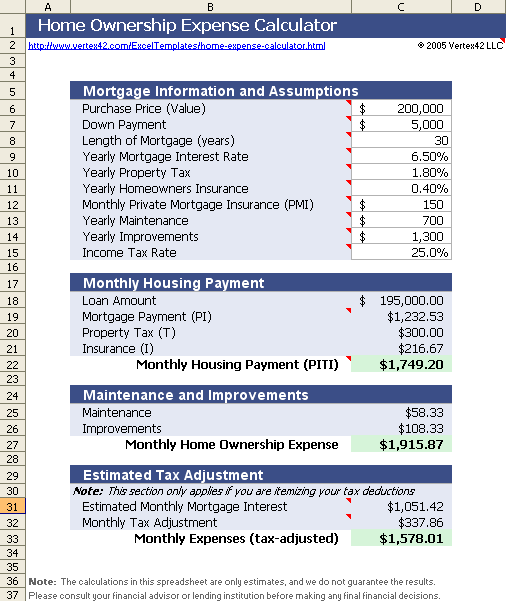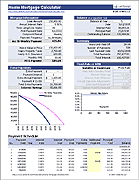Home Expense Calculator
When looking for a home to buy, one of the main questions is "What can I afford?" This is different than the question of "What size of loan do I qualify for?" Let's say that after reviewing your finances you find that you can afford to spend $1200 a month on housing. It is not just the loan payment that is important to consider, but also the property tax, insurance, maintenance, and home improvements.
NEW Calculator: Check out our new Home Affordability Calculator for an alternative to the spreadsheet below, especially if you are looking for something that is based on income, debt-to-income ratio, and down payment.
Home Ownership Expense Calculator
for Excel and Google SheetsDownload
⤓ Excel (.xlsx)License: Personal Use (not for distribution or resale)
"No installation, no macros - just a simple spreadsheet" - by Jon Wittwer
Description
How much home can I afford? This spreadsheet helps answer this question by taking into account the mortgage payment (Principal + Interest), property Taxes, and Insurance (PITI) and also maintenance and home improvements.
If you know what monthly payment you can afford, use the Goal Seek tool to solve for the purchase price of the home!
10 Strategies for Paying Off Your Mortgage Early
Using the Home Expense Calculator
The Home Ownership Expense Calculator spreadsheet will help you estimate the monthly cost of home ownership, which is one of the main considerations in deciding what home you can afford.
The spreadsheet contains definitions for some of the terms in the cell comments. You can also read more about some of the specific expenses resulting from home ownership below the download block.
Home Expenses Included in the Calculator
Property Taxes
Annual property taxes are often based on a percentage of the property value. The average is around 1.8%, but you should call your Tax Collector's office in the city where you plan to buy the home for more information.
Homeowners Insurance
This type of insurance is meant to cover the dwelling, personal property, personal liability, etc. (depending on your specific policy). The annual cost of homeowners insurance is often estimated as a percentage of the property value, averaging about 0.4%.
Private Mortgage Insurance (PMI)
Many lenders require PMI when down payments are less than 20 percent of the purchase price.
Maintenance and Improvements
Maintenance: This includes repairs such as fixing plumbing, painting, or paying to have your lawn mowed and weeds pulled. When selling your house, maintenance costs are not tax deductible.
Improvements: Although you might not spend this amount each year, improvements such as roof replacements, remodeling, additions, etc. need to be budgeted. Money spent on some improvements (particularly those that permanently increase the value) may actually be tax deductible when selling the home, so keep receipts.
A rule of thumb for the annual cost of maintenance and improvements is 1% of the purchase price (according to Home Buying for Dummies).
Tax Adjustment
If you are itemizing deductions on your tax return, then you will probably be able to deduct mortgage interest and property taxes. Consult with an accountant to determine what your tax rate will be and whether you ought to take the standard deduction instead. Many first-time home buyers find it better to take the standard deduction their first year, particularly if the home is not purchased until the middle or end of the year.
The spreadsheet includes an estimate of the tax adjustment, based upon multiplying the combined federal/state tax rate by the monthly mortgage interest and property tax. This is only an approximation, because the amount of mortgage interest changes with each payment (for most mortgage loans).
To be conservative, you may want to disregard the tax adjustment when estimating your home expenses. Because the tax benefits are usually not seen until you get your tax return, if may be wiser to take this conservative approach when figuring out what home expense you can afford.
More Calculators
- Balloon Payment Loan Calculator
- Extra Payment Mortgage Calculator
- ARM Loan Calculator
- Home Equity Loan Calculator
- Amortization Calculation Formula
- Amortization Formulas in Excel
- Amortization Calculator (web-based)
Resources and References
- Government Resources for Homeowners : Links to authorative information
- Home Buying for Dummies, by Eric Tyson and Ray Brown.
- CNN Money: How Much House Can You Afford? : A very nice online calculator!


